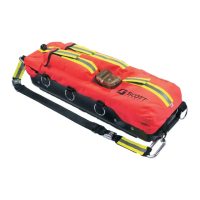Page 22 of 36
P/N 595225-01 Rev C 4/12
LOW PRESSURE AIR SUPPLY USE
The members of the Rapid Intervention Team must be thoroughly trained and familiar
withtheidenticationandoperationofeachLowPressureconnectionmethodandthe
appropriate application of each. Use care when handling the Low Pressure Air Supply
HoseandManifold.
Verify which SCOTT respirator options are in use in your respiratory protection program
and how to connect the SCOTT RIT-PAK III portable air supply unit to the equipment in
usebytheprogram.TheRIT-PAKIIIportableairsupplymaybeconguredwithvarious
low pressure quick disconnect couplings to accommodate different respirator applications.
Understand how to identify and operate all couplings.
NOTE
THEEND-OF-SERVICEALARMONTHERESPIRATORMAYNOTOPERATENORMALLY
WHENBEINGSUPPLIEDBYTHERIT-PAKIIIPORTABLEAIRSUPPLY.AMEMBEROF
THETEAMMUSTMONITORTHEAIRSUPPLYFORTHERESPIRATORUSERUNTIL
THERESCUEISCOMPLETE.
On SCOTT self-contained breathing apparatus (SCBA) respirators, connection to the LOW
pressure air supply hose may be made to one of the following methods depending on how
therespiratoriscongured:
– To the SCOTT facepiece mounted regulator if it is equipped with an in-line
quick disconnect
– To the SCOTT Emergency Breathing Support System (EBSS or “Buddy
Breather”)
– To the Extended Duration supplied air airline connection on the respirator.
Additional ports are provided on the LOW pressure air supply hose manifold for the in-
stallationofotherquickdisconnectttings.RefertotheINSTALLATIONOFALTERNATE
QUICK DISCONNECT COUPLINGS section of this instruction for details.
In addition, use of the optional Emergency facepiece and Emergency breathing regulator
provides another method of supplying breathing air to the respirator user. Refer to the
USE OFTHE EMERGENCY FACEPIECEAND BREATHINGREGULATORsection of
this instruction.
Every emergency situation is unique. The users of this equipment must be fully trained
to assess the situation and the risks involved and decide how best to use this equip-
ment.
Special instruction and care is required for use of this equipment. When the system is
pressurized, the Low Pressure hose can release compressed air at 160 psi. Compressed
air pointed at unprotected skin may cause transmission of air into the blood stream caus-
ing air embolism and other tissue damage. Compressed air introduced into a body cavity
may cause serious or fatal injury.
AlwayspositiontheSCOTTRIT-PAKIIIportableairsupplyonasafe,at,levelsurface
wheretheunitorcylinderwillnotshiftorslide.Avoiddirectcontactwithreorameor
other sources of heat.
Use care when handling the LOW pressure airline assembly to avoid snagging or tangling
of the hoses and misuse or damage which could result in partial or complete loss of
breathing air or the uncontrolled release of compressed air. Any damage to the hoses
such as cuts or breakage, or damage to the pressure reducer assembly or quick discon-
nects may result in uncontrolled air loss from the respirator.
WARNING
USERS OF SCOTT RIT-PAK III PORTABLE
AIR SUPPLY MUST BE SUPPLIED WITH AND
FULLY TRAINED IN THE IDENTIFICATION,
OPERATION, AND USE OF THE DIFFERENT
LOW PRESSURE QUICK DISCONNECTS
WHICH MAY BE ENCOUNTERED IN
EMERGENCY SITUATIONS. FAILURE TO
PROVIDE THE CORRECT EQUIPMENT
AND TO FULLY TRAIN PERSONNEL IN THE
USE OF THE EQUIPMENT MAY RESULT IN
SERIOUS INJURY OR DEATH.
LOW PRESSURE AIR SUPPLY
WARNING
SCOTT RIT-PAK III PORTABLE AIR SUPPLY
IS EQUIPPED WITH A BELL END-OF-
SERVICE ALARM AS WELL AS THE
LED DISPLAY TO SIGNIFY WHEN THE
CYLINDER HAS ONLY ONE QUARTER
OF ITS FULL CAPACITY REMAINING.
THE END-OF-SERVICE ALARM ON THE
USER’S RESPIRATOR MAY NOT OPERATE
NORMALLY WHEN BEING SUPPLIED BY
THE RIT-PAK III PORTABLE AIR SUPPLY.
FAILURE TO ASSIGN A PROPERLY
TRAINED PERSON TO MONITOR THE
AIR GAUGE OF THE CYLINDER AND
VALVE ASSEMBLY USED WITH THE
SCOTT RIT-PAK III PORTABLE AIR
SUPPLY AND/OR FAILURE TO MAINTAIN
EFFECTIVE COMMUNICATIONS WITH
THE RESPIRATOR USER MAY RESULT IN
SUDDEN AND UNEXPECTED TERMINATION
OF THE AIR SUPPLY TO THE USER OF THE
RESPIRATOR AND LEAD TO SERIOUS
INJURY OR DEATH.

